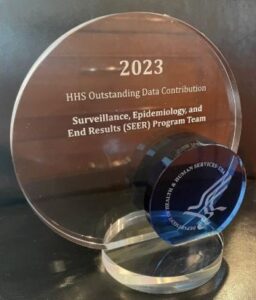
NAACCR would like to extend a well-deserved Congratulations to our partners at the NCI SEER Program for their recognition for HHS Outstanding Data Contribution as part of the inaugural U.S. Department of Health and Human Services (HHS) Data Excellence Awards. The award comes as SEER marks its 50th anniversary of turning cancer data into discovery. Today, the SEER program encompasses 28 central cancer registries, representing 48% of the U.S. population. Each year, SEER receives more than 850,000 incident cancer cases, all meticulously collected and harmonized by registries. These data are critical to the fight against cancer.
Steve Friedman, Senior Advisor of Operations at SEER, noted that the award is not for the SEER program team alone but encompasses NAACCR and all the registries that contribute data to SEER. “Thanks for all of your ongoing contributions and leadership to the cancer surveillance community and the SEER Program to help enable us to win this prestigious award!” Mr. Friedman said.
NAACCR and SEER have a long history of collaborating to promote the use of population-based cancer registry data. That collaboration has led to establishing the Virtual Pooled Registry Cancer Linkage System (VPR-CLS) and National Childhood Cancer Registry (NCCR). Both projects rely on the high-quality data collected and curated by central cancer registries. To learn more about how NAACCR evaluates the quality of registry data, see the NAACCR certification criteria.
Congratulations to SEER and all the registries on a job well done!
Tags: Data Quality, Featured, Recognition, SEER
What to Read Next
NAACCR Education and Training Upcoming Events
NAACCR ODS Exam Prep and Review The NAACCR ODS Exam Prep and Review series is offered prior to each exam…
Standardization and Registry Development Steering Committee: Modular Records Task Force
One of the NAACCR Board strategic initiatives in the Strategic Plan is Innovative Approaches to Data Collection (Minimal Datasets and…






